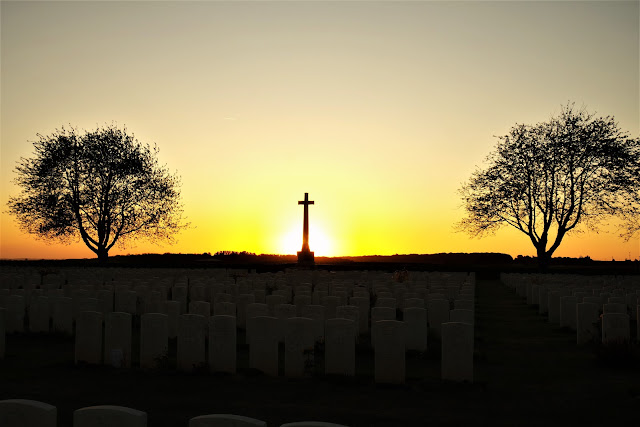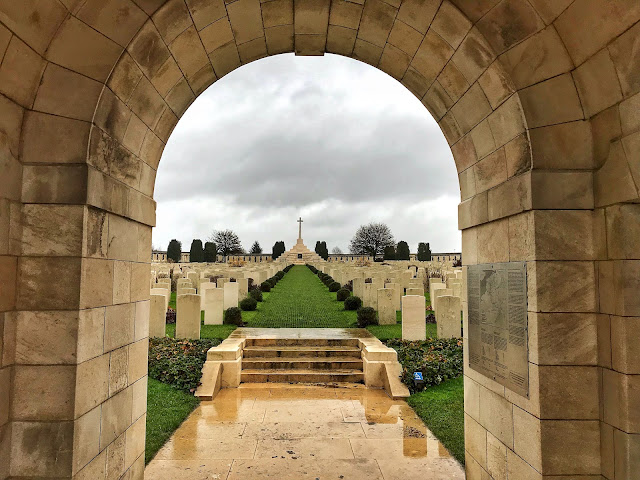"Duty Nobly Done" - Inscribing Meaning to the First World War
When visiting the battlefields, one of the things I find most interesting to look out for in the cemeteries is the choice of inscriptions on the headstones, selected by the soldiers' families. As expected, themes of love and faith are common. 'Till we meet again' and 'To live in the hearts of those we love is not to die' could likely be found in any cemetery, reflecting grief for the departed.
Yet in war cemeteries, there are additional trends borne out of families grasping for meaning and justification for the premature loss of their sons and husbands. Duty is one such prevalent image, typified by the simple and often repeated phrase 'duty nobly done'.
Brief, definite and honourable, these three words give reason to the soldiers' sacrifice. To fight was their responsibility, which they did with virtue, ultimately achieving what was required of them. So pertinent is the phrase that innumerable unit and local histories of the First World War have also been given it as their title.
Yet such brevity implies a recognition and understanding from all who view the grave of what that 'duty' constituted. The phrase has its origins in King George V's message to the troops on their initial departure to the front in August 1914. With 'implicit confidence in you, my soldiers' he told them 'duty is your watchword, and I know your duty will be nobly done'. Using 'duty nobly done' as an epitaph is thereby confirmation that this will had been achieved.
The King's message describes the aim of the war to be 'to fight for the safety and honour of my Empire', as well as to rescue Belgium and France from a 'powerful foe'. Addressed to the Regular Army, it was their responsibility to achieve these goals. This duty to do "their bit" for "King and Country" took on a life of its own in the patriotic zeal of mass enlistment in the Autumn of 1914, developing on the Victorian language of imperial jingoism.
Yet I would contend that George V's isolation of 'duty' as the soldiers' watchword speaks to something higher than just the patriotic focus of the military, which is reinforced by the adoption of 'duty nobly done' as a popular epitaph. In a pamphlet entitled 'Swinging the Lead', Chaplain to the Forces Harold Puttock describes the damage that can be done by shirking duty. His image is clearly militaristic, cautioning that one's malingering 'makes things harder for his comrades', yet he also warns that this can become a 'moral habit' that affects all aspects of life. He presents the idea of intersecting duties, in personal relations and national responsibilities, as well as most notably man's 'highest duty ... to Christ and Christ's kingdom'.
It can therefore be seen that duty to the nation was inherently tied to duty to God, as echoed by theologian John Oman who argued in 1915 that men must have 'a single eye to duty' throughout the war. His conception of duty was one reliant on dedication to God above all else. The 'national cause' certainly came into this, but, to him, it was wrong to be 'intent on nothing but victory'. Devotion to duty must be based on what is right and not what one can gain from it.
Both Puttock and Oman are, of course, men of faith who speak from a Christian perspective. Yet it can be seen that their ideas were consistent with those that guided the national narrative. As historian David Monger has identified, the National War Aims Committee, for whom it was the responsibility to bolster civilian morale, placed an emphasis on duty in their 'patriotic narrative' that was rooted in the religiously-based 'language of sacrifice'.
To fully investigate conceptions of sacrifice in the First World War would be a topic for another article, yet as Monger quotes Max Jones, focusing on sacrifice could 'ascribe meaning' to loss. This can be seen in the 'duty nobly done' epitaph. The finality of 'done', suggests a completion, akin to a martyrdom through which the soldier is seen to have demonstrated ultimate duty and made, in another Great War image, the Supreme Sacrifice. Such an image is a reflection of Christ's crucifixion and fosters a kinship between the soldier's suffering and the life of Christ.
'This imagery of salvation through death in battle' has, in turn, been highlighted by James Lachlan MacLeod, who goes on to suggest the importance of phrasing the war as a 'noble cause' in which men fought for the moral mission of liberating Belgium and France. This connects back to George V's message, but places that practical defence of two nations within a Christian moralistic framework. They were not only soldiers of Britain, but Soldiers of Christ arising, for whom they would 'tread all the powers of darkness down, and win the well fought day'.
For a family choosing an inscription for their fallen son's grave, 'duty nobly done' would therefore represent a sacrificial victory. They had not just done what was asked of them, but had fulfilled a moral responsibility to themselves, their nation, and God. I think it is important to note here that it was, by and large, the families who chose these epitaphs and not the soldiers in advance. Phrases such as 'duty nobly done' were selected not because they reflected the reality of a soldier's experience, but because they comforted and celebrated, gave purpose, and most of all ascribed meaning to the devastating loss of so many so soon.
Kathryn
References
http://www.crichparish-ww1.co.uk/ww1webpages/kingsmessage.html
http://www.epitaphsofthegreatwar.com/
James Lachlan MacLeod, '"Greater Love hath no Man than this': Scotland's CConflicting Religious Responses to Death in the Great War', Scottish Historical Review 81 (2002).
David Monger, Patriotism and Propaganda in First World War Britain: The National War Aims Committee and Civilian Morale, (Liverpool: Liverpool University Press, 2012).
Harold Puttock, 'Swinging the Lead', (London: Red Triangle Press)



Thank you Kathryn, a very interesting perspective, I am also fascinated with the inscriptions and the probable turmoil of a family trying to find the right words. The blog content hints at a type of 'muscular Christianity' preached by the Methodists. I wonder if you have pin pointed where the inscriptors may have lived. There might be a geographical angle here. Very interesting subject thank you for sharing.
ReplyDelete